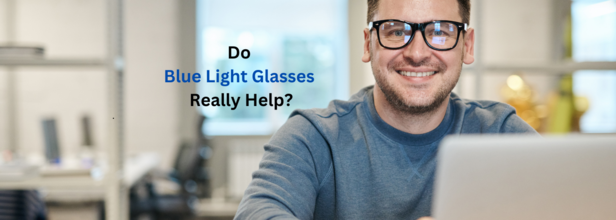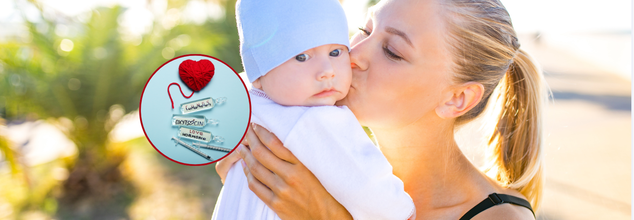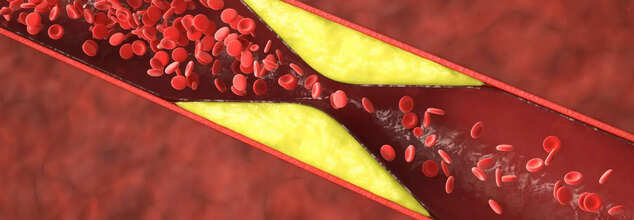
Credits: Canva
Do Blue Light Glasses Actually Protect Our Eyes?
Have you come across blue lenses? Every time I go to get my new glasses made, I am always asked whether I want the blue lenses. But what exactly are these blue lenses? I am told that it protects your eyes from the blue light that comes from our phone and computer screens. With the rise of digital device and spending most hours of our day on screen, concerns over blue light exposure have grown significantly. This is why blue light glasses and lenses have been introduced to help mitigate potential harm. But the question is: are they really that effective or are there other ways to protect your eyes from blue light-related symptoms like eye fatigue and dry eye?
Let’s break it down.
What is Blue Light?
Blue light is a type of visible light, which has a shorter wavelength of 415 to 455 nanometers, this is what gives it more energy than other light types. The source is not artificial, but also when we look up at the blue sky.
However, for years, humans were exposed to this blue light only during the hours when sun was up. This is why our brain trained us to be active and alert and keep our bodies up when we see that light. However, with phones and computer screens which emit blue light all the time, leaves our body and brain confused. It also interferes in the circadian rhythm of the body.
Too much blue light during the day can lead to:
- Eye fatigue: Prolonged screen time can make your eyes feel strained.
- Dry eye: Staring at screens reduces your blinking rate, causing dryness.
- Sleep disruption: Blue light interferes with melatonin production, a hormone crucial for sleep, leading to poor sleep quality.
What Are Blue Light Glasses?
Blue light glasses are designed to filter out blue light wavelengths before they reach your eyes. The idea is that this filtering minimizes the harmful effects of prolonged exposure, like eyestrain, dry eye, and disrupted sleep patterns.
But do they actually work?
The evidence is mixed.
The American Academy of Ophthalmology does not currently endorse blue-light-filtering glasses for reducing computer-related eyestrain, suggesting more research is needed.
- A 2023 study, titled Blue-Light Filtering Spectacle Lenses: Optical and Clinical Performances, found no significant short-term benefits of blue-light-filtering lenses in reducing visual fatigue compared to regular lenses.
- A 2017 review of clinical trials, published in the National Library of Medicine showed limited evidence supporting blue-light-blocking glasses for eye health and dry eye prevention.
- Some users report benefits like reduced glare and improved screen visibility, but studies like one funded by Swiss Lens Laboratory Ltd. suggest potential bias.
Practical Tips to Reduce Blue Light Exposure
You don’t need special glasses to protect your eyes from blue light. Simple lifestyle changes can make a big difference:
- Follow the 20-20-20 rule: Every 20 minutes, look at something 20 feet away for 20 seconds. This reduces eye strain.
- Take screen breaks: Step outside for a walk, leaving your devices behind. This not only gives your eyes a break but also boosts vitamin D levels.
- Dim your lighting: Use softer lighting at home, and consider red light for nightlights, as it’s less disruptive to your sleep cycle.
- Adopt screen-free hobbies: Activities like reading, knitting, or cooking can help you reduce screen time.
- Limit screens before bed: Avoid devices for 2–3 hours before sleeping to improve sleep quality.
- Use lubricating eye drops: If dry eye is a problem, over-the-counter drops can provide relief.
What Are the Side Effects of Blue Light Exposure?
Prolonged exposure to blue light can cause:
- Computer Vision Syndrome: Symptoms include eyestrain, dry eye, blurred vision, and headaches.
- Sleep disturbances: Reduced melatonin production disrupts your circadian rhythm, impacting your ability to fall and stay asleep.
- Stress sensitivity: Poor sleep due to blue light exposure can increase stress levels, as REM sleep is essential for mental relaxation.
When to See a Doctor
If you experience persistent or severe symptoms, consult an eye doctor. Warning signs include:
Frequent or long-lasting eyestrain
Chronic dry eye symptoms
Noticeable decline in vision quality
Consistently blurred vision

Credit: Canva
India Confirms 1st Bird Flu Human Death In 4 Years—Know Everything About It
India has reported its second human fatality due to highly pathogenic avian influenza (HPAI) or bird flu, marking the first such death in four years. While bird flu infections in humans are rare, they are highly lethal, with a fatality rate of one in two cases. The most recent victim was a two-year-old girl from Palnadu, Andhra Pradesh, who passed away in mid-March after being hospitalized for over 10 days at the All India Institute of Medical Sciences (AIIMS), Mangalgiri.
The pathogen responsible for the infection and subsequent deaths was confirmed only on 31 March, following a survey by the Indian Council of Medical Research-National Institute of Virology (ICMR-NIV). According to details shared by the state government, the child, who had a habit of consuming raw chicken, was admitted to the hospital on 4 March with symptoms including fever, breathlessness, nasal discharge, seizures, diarrhea, and reduced feeding. Two days before falling ill, she had reportedly consumed raw chicken. She succumbed to the infection 12 days later.
In a statement issued on Wednesday, the state government noted that no abnormal cases of respiratory infections had been identified in the ongoing survey. However, surveillance will continue for the next two weeks, with testing arranged for any suspected cases. Union health ministry officials stated that, based on data from the Integrated Disease Surveillance Programme (IDSP), no unusual surge in influenza-like illness (ILI) or severe acute respiratory illness (SARI) cases has been observed in the district in recent weeks.
A national joint outbreak response (NJOR) team has been deployed to conduct an epidemiological investigation and provide assistance to the state.
3 States Impacted By Bird Flu
This year, outbreaks of HPAI—also known as Influenza A virus subtype H5N1 or bird flu—have been reported in Maharashtra, Karnataka, and Andhra Pradesh. The trend follows a similar pattern observed in 2024, when states such as Jharkhand and Kerala, along with the aforementioned three states, recorded widespread H5N1 infections in poultry, prompting authorities to cull thousands of birds.The Union government emphasized that "human-to-human transmission of the H5N1 virus is uncommon, and the risk of any other epidemiologically linked case being reported is assessed to be low."
India's first recorded human infection of the H5N1 influenza virus occurred in 2021 when an 18-year-old boy in Haryana succumbed to the infection within days of contracting it.
In May last year, Australia reported its first human infection with H5N1, stating that the patient had acquired the virus in India. Towards the end of 2024, the deaths of four big cats—three tigers and a leopard—were attributed to H5N1 infection.

How 'Love Hormone' Oxytocin Might Not Cause But Pause Your Pregnancy?
Oxytocin, commonly referred to as the "love hormone" because it is involved in bonding and social behavior, is now being investigated for its surprise effect on pregnancy. Although oxytocin is traditionally linked to childbirth, milk letdown during lactation, and emotional bonding, recent findings indicate that this hormone can possibly delay early pregnancy. A study on mice conducted recently has helped explain how the hormone can stop embryonic growth, which may provide new understanding of human fertility and pregnancy.
In a few mammals, such as marsupials, bats, and more than 130 others, a process called "diapause" takes place. This is a natural biological phenomenon that sees embryos suspend their development in order to wait until the right conditions prevail for pregnancy to resume. Although very uncommon and hard to monitor in human beings, clinical experience from in vitro fertilization clinics indicates that human embryos might at times show delayed implantation. One highly documented case in 1996 showed that an embryo implanted in a uterus was in a suspended state for five weeks before implantation took place.
The new research by scientists at the NYU Grossman School of Medicine investigated oxytocin's possible role in inducing this pause in pregnancy. Their results indicate that oxytocin could be a major player in controlling diapause in mice, and they raise questions about its possible role in human pregnancies.
Oxytocin-Induced Pregnancy Pause
To study the impact of oxytocin on pregnancy, scientists tested female mice who had recently given birth by letting them be mated while still lactating. The research revealed that nursing females had pregnancies that lasted about a week longer than those of the non-nursing mice. Since the normal pregnancy in mice takes only 19 to 21 days, this postponement is a drastic halt to embryonic development.
The research team then sought to determine how this pause occurred. Using optogenetics, a technique that enables the activation of specific neurons through light stimulation, they artificially triggered the release of oxytocin in pregnant mice. After five days of oxytocin stimulation, the researchers examined the mice’s uteruses and found that five out of six had embryos in a dormant state, indicative of diapause. Conversely, pregnant mice that were not administered oxytocin stimulation did not exhibit any indication of developmental arrest.
In further confirmation of their research findings, the scientists administered oxytocin to early-stage mouse embryos in the laboratory setting. They detected identical cellular alteration related to diapause, implying that oxytocin has a direct influence on suspended embryonic development.
How Oxytocin Affects Embryonic Development?
The research showed that oxytocin slows down the process through which embryonic cells convert genetic information into proteins. This process, essential for growth and development of the cell, is copying DNA instructions into RNA, which then guides protein synthesis. By suppressing this process, oxytocin puts the embryo into suspended animation.
Interestingly, scientists also learned that embryos without oxytocin receptors were still able to enter diapause, suggesting that more than one biological pathway is used to trigger the pause. Still, having working oxytocin receptors seemed to increase the embryo's chances of surviving the halted state. When oxytocin receptors in the embryos were deactivated, survival rates while in diapause fell to 11% from 42%.
Implications for Human Fertility and Pregnancy
Although this research is in its infancy, it presents exciting possibilities for human fertility studies. A better grasp of the role oxytocin plays during early pregnancy may lead to significant advances in treating unexplained infertility and recurrent miscarriage. If human embryos can enter a state of diapause, further study could reveal how hormonal or environmental influences are responsible for early pregnancy loss.
Also, these discoveries may have greater implications outside pregnancy. As oxytocin is implicated in cell survival, researchers now want to know if what it does in diapause can help understand how to keep nerve cells from dying in the developing nervous system. What stops cells from dying early on might help neurobiology and regenerative medicine advance.
Even with these thrilling findings, much remains to be answered. How long can diapause be in various species, including humans? What are other biochemical signals that cooperate with oxytocin to control embryonic development? And might this information one day lead to targeted fertility treatments or interventions?
More studies are needed to uncover these secrets. As researchers learn more about the multifaceted functions of oxytocin, its image as just the "love hormone" is changing. This potent molecule seems to play a much more intricate function in reproductive biology than has been known, and it may play a role not only in when life starts, but in when it temporarily gets suspended.
Oxytocin's role in pregnancy is turning out to be more complex than originally thought. Though still a primary force behind labor and maternal attachment, it has also recently been found to retard embryonic development, which could have far-reaching consequences for reproductive science. As more research unfolds, the hormone could provide new insights into fertility, enhance IVF success, and even prevent early miscarriage. The possibility of oxytocin-based fertility therapies is an exciting one, and future research will be important to determine how this information can be translated to human pregnancy.

Credit: Canva
These 5 Factors Could Determine How Long You'll Live—And Cholesterol Is the Least Important
A study published in the New England Journal of Medicine has listed five key factors that impact the longevity of individuals. The research tracked participants for up to 47 years, assessing how five specific factors influenced their risk of death, longevity, and the number of healthy years they could gain by altering these habits. The conclusions of this study were based on data analyzed from over two million adults aged 18 and above across 39 countries.
Five Factors That Influence Longevity
- High blood pressure
- High cholesterol
- Diabetes
- Smoking
- Bodyweight, including being overweight and underweight
Women Could Add 14 Years To Their Lives
As per the researchers, women who didn't have these five risk factors at age 50 could potentially add more than 14 years to their lives, and men could gain almost 12 additional years. Men were most affected by these factors as those with all five faced a 94% chance of dying before 90, while their counterparts without these issues had just a 68% chance. Women with all five risk factors at age 50 had an 88% chance of dying before 90, whereas those without these problems had a 53% chance.
Diabetes Is The Main Factor
Out of all the factors, cholesterol was the least impactful of all. As per the study, people who lowered their cholesterol levels could only add 1.2 extra healthy years to their lifespan. On the contrary, individuals who quit smoking could potentially extend their lives by up to six years. Women who do not have diabetes could gain an extra 6.4 years, while men without the condition might see an increase of 5.8 years. Even a slight reduction in blood pressure could lead to an additional 1.8 healthy years, and achieving a normal BMI could contribute an extra 2.6 years, with variations depending on the region.
Importance Of Lifestyle Changes
The study reinforces the importance of lifestyle modifications in extending a healthy lifespan. The researchers noted that small but consistent changes in daily habits could significantly impact longevity. For example, maintaining an optimal weight through a balanced diet and regular physical activity helps control blood pressure, diabetes, and cholesterol levels, reducing overall health risks.
Smoking cessation emerged as the most crucial lifestyle change that could dramatically influence lifespan. Quitting smoking, even later in life, significantly reduces the risk of cardiovascular diseases, lung disorders, and certain cancers, contributing to longer and healthier lives. Similarly, diabetes management through dietary changes, regular exercise, and proper medical intervention plays a vital role in preventing complications and enhancing longevity.
Regional And Gender-Based Differences
The study also highlighted variations in longevity gains based on gender and geographical regions. For instance, men were more susceptible to the adverse effects of these five risk factors than women. This disparity could be attributed to lifestyle differences, genetic predisposition, or healthcare access.
Additionally, in certain countries with high obesity rates, maintaining a normal BMI was one of the most significant contributors to longevity. Meanwhile, in regions with lower tobacco consumption, factors like high blood pressure and diabetes had a more prominent role in affecting lifespan.
© 2024 Bennett, Coleman & Company Limited

